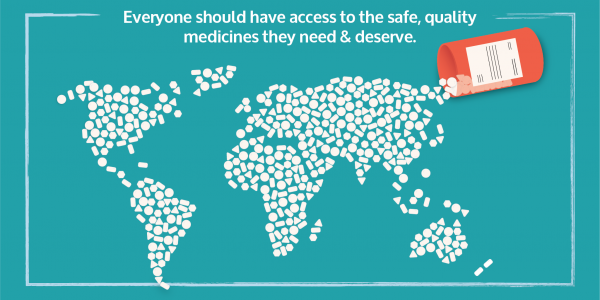Experts to seek consensus on tackling poor quality medicines
A pioneering conference will bring leading professionals from all over the world to Oxford, UK to discuss strategies for tackling poor quality medical products on a global scale.

The proliferation of poor quality medical products (medicines, vaccines and devices) is an important but neglected public health problem, threatening millions of people all over the world, both in developing and wealthy countries. A recent report from the World Health Organization found that an estimated 1 in 10 medicines in low- and middle-income countries were falsified or substandard. Falsified diazepam found across Scotland has been reported as being “cheaper than chips”.
Falsified and substandard medicines, which may have the incorrect or wrong dose of pharmaceutical ingredients, or no active ingredients at all, may result in death, prolonged illness, side effects or loss of trust in healthcare systems; for antimicrobials they are also likely to be a key driver of antimicrobial resistance (AMR).
“Our ability to tackle the issue is hampered by its complexity,” said Prof Paul Newton, Head of the Medicine Quality Group at the Infectious Diseases Data Observatory (IDDO) and the instigator of the conference. “Criminals are becoming more sophisticated, using the internet as well as offline pharmacies for distribution, creating falsified medicines and working across geographical boundaries and in countries with varying legislation and levels of enforcement. Errors in factories without sufficient quality control results in substandard medicines, often containing insufficient ingredients, that because they look genuine are hard to detect.
“The issue affects a broad range of stakeholders from individual patients, pharmacists and medicine regulatory authorities to the pharmaceutical industry and law enforcement agencies. We need to better understand the scale of the problem, raise awareness and encourage interventions and support so that every country has a functional medicine regulatory agency to ensure that we all have access to medicines we can trust ,” said Prof Newton.
“The conference will be an important opportunity for the diverse stakeholders involved in medicine quality and regulation to come together within the framework of a dedicated academic conference to share ideas and expertise. One of the event’s key objectives is to develop a consensus statement to be widely disseminated to interested parties and policy-makers, forming the basis of a coordinated global effort to tackle poor quality medical products.”
The Medicine Quality & Public Health Conference (MQPH2018) will provide a unique opportunity for medicines regulatory authorities, health workers, scientists, pharmacists, sociologists, economists and international organisations to discuss the problem and outline the necessary steps to address this important issue.
The Conference is expected to attract leading authorities from all over the world, including representatives from a diversity of organisations in low- and middle-income countries, where the issue of poor quality medicines is often more pronounced due to inadequate surveillance systems.
More information about the speakers can be found on the conference website.
The Medicine Quality & Public Health Conference will take place at Keble College, Oxford from 23-28 September 2018. If you are interested in attending the conference or would like to find out more, please visit the conference website or email mqph2018@ndm.ox.ac.uk.
Join our discussion on Twitter #MQPH2018
The deadline for submitting abstracts is 18 June 2018.
The deadline for registration is 31 August 2018.
A limited number of early bird places are available on a first come, first served basis.
Editor’s notes
The Medicine Quality & Public Health Conference is being organised by the Centre for Tropical Medicine & Global Health at the University of Oxford, the Infectious Diseases Data Observatory and the Mahidol Oxford Tropical Medicine Research Unit.
IDDO’s Medicine Quality Group encourages discussion of poor quality medicine epidemiology, detection and prevention, and aims to facilitate improvement in the quality of medicines that patients take. IDDO facilitates the sharing of data and expertise and collation of information to increase understanding of the prevalence and distribution of poor quality medicines around the world.
Definitions of falsified and substandard medicines were agreed by the World Health Organization in May 2017. The definitions are: “Substandard” medical products (also called “out of specification”) are authorized by national regulatory authorities, but fail to meet either national or international quality standards or specifications – or in some cases, both. “Falsified” medical products deliberately or fraudulently misrepresent their identity, composition or source.
For further information or interviews, please contact Jing Xu jing.xu@iddo.org or Anne Whitehouse anne.whitehouse@iddo.org +44(0) 1865 612948.
